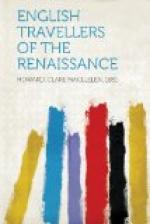But it was not really the low material dangers of small-pox, quartain ague, or robbers which troubled the Elizabethan. Such considerations were beneath his heroical temper. Sir Edward Winsor, warned against the piratical Gulf of Malta, writes: “And for that it should not be said an Englishman to come so far to see Malta, and to have turned backe againe, I determined rather making my sepulker of that Golfe."[99] It was the sort of danger that weakened character which made people doubt the benefits of travel. So far we have not mentioned in our description of the books addressed to travellers any of the reminders of the trials of Ulysses, and dark warnings against the “Siren-songs of Italy.” Since they were written at the same time with the glowing orations in praise of travel, it might be well to consider them before we go farther.
* * * * *
CHAPTER III
SOME CYNICAL ASPERSIONS UPON THE BENEFITS OF TRAVEL
The traveller newly returned from foreign lands was a great butt for the satirists. In Elizabethan times his bows and tremendous politeness, his close-fitting black clothes from Venice, his French accent, his finicky refinements, such as perfumes and pick-tooths, were highly offensive to the plain Englishman. One was always sure of an appreciative audience if he railed at the “disguised garments and desperate hats” of the “affectate traveller” how; his attire spoke French or Italian, and his gait cried “behold me!” how he spoke his own language with shame and loathing.[100] “You shall see a dapper Jacke, that hath beene but over at Deepe,[101] wring his face round about, as a man would stir up a mustard-pot, and talke English through the teeth, like ... Monsieur Mingo de Moustrap."[102] Nash was one of the best at describing some who had lived in France for half-a-dozen years, “and when they came home, they have hyd a little weerish leane face under a broad French hat, kept a terrible coyle with the dust in the streete in their long cloaks of gray paper, and spoke English strangely. Naught else have they profited by their travell, save learnt to distinguish of the true Burdeaux Grape, and know a cup of neate Gascoygne wine from wine of Orleance; yea, and peradventure this also, to esteeme of the poxe as a pimple, to weare a velvet patch on their face, and walke melancholy with their armes folded."[103]
The Frenchified traveller came in for a good share of satire, but darker things were said of the Italianate Englishman. He was an atheist—a creature hitherto unknown in England—who boldly laughed to scorn both Protestant and Papist. He mocked the Pope, railed on Luther, and liked none, but only himself.[104] “I care not,” he said, “what you talk to me of God, so as I may have the prince and the laws of the realm on my side."[105] In politics he allied himself with the Papists, they being more of his way of living than the Puritans, but he was




